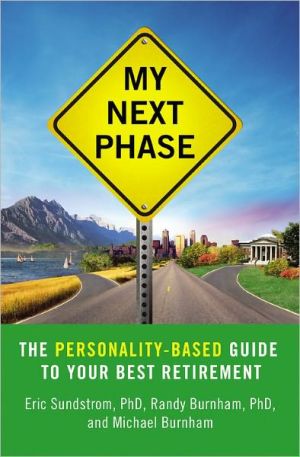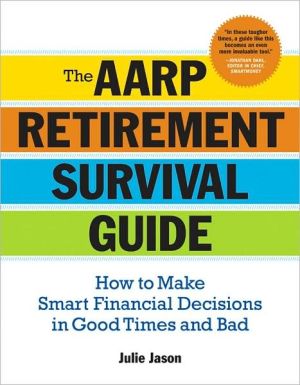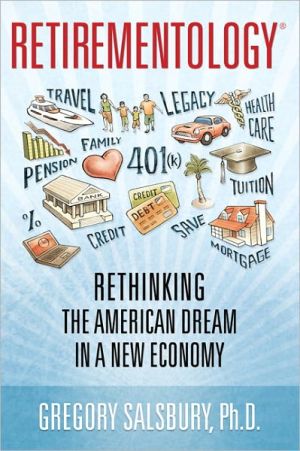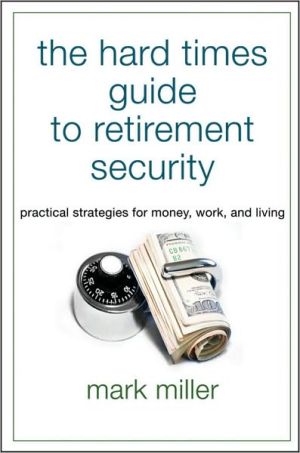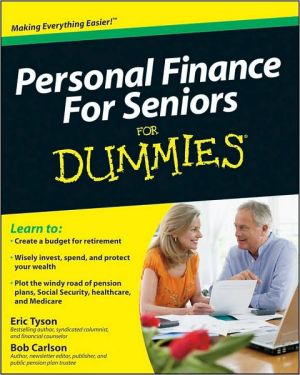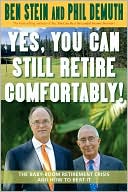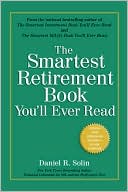My Next Phase: The Personality-Based Guide to Your Best Retirement
Too many people 'flunk' retirement—even after a lifetime of hard work. Why? Because they only plan on their financial needs, not their emotional ones as they move into the next phase of life.\ The key to a successful retirement lies in your personality, NOT in your bank account. My Next Phase—featured in The New York Times, BusinessWeek, and The Washington Post—offers a revolutionary, step-by-step process to figure out your personal "Retirement Style" and creates a unique retirement plan...
Search in google:
Too many people 'flunk' retirement—even after a lifetime of hard work. Why? Because they only plan on their financial needs, not their emotional ones as they move into the next phase of life. The key to a successful retirement lies in your personality, NOT in your bank account. My Next Phase—featured in The New York Times, BusinessWeek, and The Washington Post—offers a revolutionary, step-by-step process to figure out your personal "Retirement Style" and creates a unique retirement plan based on who you are. Take the My Next Phase quizzes and find out:WHAT'S YOUR SOCIAL STYLE? If you're outgoing, you'll need companionship through your days, whether you leave your job or keep working. If you're contemplative, you'll need solitude as well as social connection to find the fulfillment in the years ahead.WHAT'S YOUR STRESS STYLE? If you're resilient, you'll push yourself to find challenge—and get bored without it. If you're responsive, you'll need to pace yourself. Either way, you'll need a passion that gives you a reason to get out of bed each day. WHAT'S YOUR PLANNING STYLE? If you're structured, you'll prefer to schedule your time. If you're flexible, you'll want a freer, less scheduled life. And many more questions (and answers) to ensure a happy, fulfilling 'next phase' of life.
My Next Phase\ \ By Eric Sundstrom Randy Burnham Michael Burnham \ Springboard Press\ Copyright © 2007 My Next Phase, LLC\ All right reserved.\ ISBN: 978-0-446-58117-2 \ \ \ \ Chapter One\ Are You Ready to Retire?\ Take the Up-4-Retirement Quiz\ RON'S HOMECOMING\ Do you know someone like Ron, so devoted to his work that he finds time for little else in life? For years his job was the center of Ron's life. Yet after two decades as a production manager at an auto parts factory, Ron made a surprise announcement at a company picnic: he would retire at age sixty-two. "My wife and I have decided to have some fun. We'll play golf, enjoy our leisure time, and relax."\ Many in Ron's department didn't expect him to retire so soon. A gregarious, outgoing manager, they saw him walk the production line most days. He had a stated goal of speaking to everyone he supervised. "Hands-on Ron," they called him, as he made a point of knowing about every job-and of freely sharing that knowledge.\ But sometimes Ron's energetic approach to supervision struck his coworkers as overly directive. "I'll never forget the day Ron called a staff meeting at eight a.m. to brainstorm new solutions for our production delays," Fred, a parts supervisor and Ron's golf buddy, said. "A dozen supervisors gathered in the small conference room and listened to Ron's solutions. He asked for ideas and took notes, and then made all the decisions himself. Ron never learned to delegate! He makes his job harder than it needs to be."\ Never much of a team player, Ron showed his independent style at home, too. His wife, Jill, told her sister, "Sure, we talked about retiring. But that was only after Ron had told his boss that 'we' would retire in June. I couldn't talk him out of it. What'll he do without his work? I know Ron will soon get bored."\ The first few weeks of retirement lived up to Ron's dreams. He continued to rise at dawn for coffee with Jill and read the newspaper and sports magazines. After breakfast Ron met friends at the city golf course for eighteen holes or went to a sports bar. On rainy days a retired neighbor would drop by to chat and join Ron watching ESPN.\ Jill continued her life as usual, walking daily at the Y, volunteering at the science museum, and fund-raising for United Way. As she predicted, within six weeks Ron showed signs of boredom, resumed smoking, and acted depressed. Jill saw his mood change after Fred canceled a Saturday golf outing at the last minute. Ron told Jill he overheard Fred telling another employee, "Hey, I'm not obligated. He's not my boss anymore." Ron felt hurt and rejected, and quit calling Fred for golf.\ Over the next month, Ron had more trouble finding golf partners. He called colleagues and work friends only to find them busy. With few friends to talk to, Ron soon lacked the energy he had at work. He began sleeping late and missing morning coffee with Jill. Ron skipped shaving some days. His smoking escalated to two packs a day.\ With too much time at home and too little to do, Ron turned his attention to Jill. He tried to organize grocery shopping and dinner menus. He made a new budget and pressed Jill to go over it with him. When Jill showed no interest, Ron got angry. They argued. Ron remained upset the whole day.\ "I knew this would happen," Jill told her sister. "He's gone from supervising employees to micromanaging me!"\ Ron clearly failed at retirement. What went wrong for him? Like many others we've met, Ron didn't plan beyond his finances. He didn't understand that with his extroverted personality, he gained energy from interacting with people. Ron needed pursuits that gave him the kind of companionship and face time his job provided. He also remained unaware of how much he depended on his work for a sense of purpose in life, his reason to get out of bed in the morning.\ JEANNE'S SATISFYING NEXT PHASE\ Unlike Ron, Jeanne, a former English instructor at a community college, made an effort to understand herself and to identify what gave her fulfillment before starting a new phase of life. With few debts, Jeanne lives on a modest pension and monthly Social Security checks, and owns a home in a quiet neighborhood where she can walk most places she goes.\ Now fully retired, Jeanne has more time for her passion: writing. Her new novel even attracted the interest of a publisher. "I started the novel more than a decade ago, but I kept tucking it away. I stayed so busy grading papers and preparing lectures that I could never find enough time for it. Now I can finally make it my focus."\ When asked about a typical day, Jeanne replied, "Most mornings I write. Some afternoons I tutor a few English students for extra income. And I find great satisfaction giving classes in English to Spanish-speaking immigrants who attend my church."\ Jeanne taught college English for thirty-five years and loved every moment. In considering retirement, she regretted the thought of giving up the personal contact with students and colleagues. Then, a few years before she decided to retire, Jeanne heard that her church had started an outreach program and needed teachers to assist immigrants. She saw a special opportunity to give back to her community.\ The Spanish culture intrigues Jeanne, and last year she saved enough to visit her niece studying abroad in Barcelona. She also started mentoring a young teacher at the community college who moved to the United States recently from Madrid.\ Jeanne looks forward to her future with confidence, knowing she has chosen satisfying pursuits that promise personal fulfillment for years to come: writing, teaching, and giving back to her community.\ THINKING ABOUT YOUR NEXT PHASE\ Ron's unsuccessful homecoming contrasted sharply with Jeanne's satisfying Next Phase. By Next Phase we mean a new stage of life reached after ending valued activities or commitments-for many of us, this means transitioning out of the standard nine-to-five job that's given our lives structure for the last forty years or so. Adjusting to the change, and beginning new pursuits that fit your circumstances and personality, is the key to a successful Next Phase of life. With self-awareness and careful planning, you, too, can enjoy an emotionally fulfilling Next Phase, and create your best retirement.\ If you belong to the baby-boom generation (born 1946 to 1964) as we do, you've experienced with us some of the changes that took us into the earlier phases of our lives: graduating from college in the sixties, seventies, or early eighties and starting full-time jobs; getting married; and having children. Of course we'll soon have to decide what we'll do in our own Next Phases as we near the traditional age of retirement. Yet while retirement used to last for only a few years, forecasters now predict life spans that reach the mideighties in the next few decades, with many people living to age one hundred or older. This dramatic increase in life span makes retirement planning more important than ever.\ What comes to mind when someone says "retirement"? Do you think of your savings, your 401(k), your company pension, or a paid-off mortgage? Those are all important ... but contrary to popular belief, a solid financial plan does not guarantee a satisfying retirement! In our work with dozens of organizations, we've seen too many people step from satisfying careers into well-funded dream retirements-only to wake up after a few months and notice something missing ... something deeply emotional and personal.\ The missing something naturally differs from one person to the next. Some miss the times they've spent with coworkers in the break room. Others yearn for the structure of a regular schedule, or the time alone with their thoughts while commuting. Many miss friends, families, and neighbors after selling their homes. Most miss the satisfaction they've felt from making a difference in somebody's life-even just a small difference.\ We've seen many people spend years preparing financial plans for retirement, yet fail to consider what will give their lives meaning after they leave work. Even with financial freedom, after a few weeks of rest and relaxation, these men and women soon feel rudderless and confused about their remaining decades. We've also seen people with small nest eggs who mistakenly assumed they had few options, in view of their finances, who ended up depressed and unhappy.\ Why? Because success in retirement has little to do with the size of your nest egg ... and everything to do with finding emotionally fulfilling pursuits that match your circumstances and personality.\ Our years of research and experience consistently reinforce one simple idea:\ Personality holds the key to success in retirement.\ Personality consists of the unique combination of preferences and habits you had as a child and learned while maturing. Among other things your personality reflects what energizes you and how you process information, make decisions, manage stress, and maintain relationships. Together, these traits powerfully determine what fulfills you now and what will sustain you later.\ Our experience shows that anyone who leaves a lifelong career without fully considering his or her personality risks failing at retirement. Yet many individuals jump into retirement with no more planning than they might give a summer vacation. Within months they feel miserable and unfulfilled-and their feelings have nothing to do with money. Success in retiring depends on having a financial plan that supports a nonfinancial plan for the next phase of life-a plan that suits your personality.\ We've written this book to help you create the nonfinancial plan you need to avoid failing at retirement. Or, if you've already failed, to help you learn from the experience and make another plan for your Next Phase that suits you better!\ Before we introduce our personality-based approach to preparing for your Next Phase, we invite you to assess your own readiness for retirement.\ UP-4-RETIREMENT QUIZ\ To see how ready you are to retire, read each statement below and mark it true or false, depending on your understanding at this moment.\ True False\ ____ ____ 1. I feel confident that I have the financial support needed for retirement.\ ____ ____ 2. I understand my own personality well enough to make choices in life that suit my disposition.\ ____ ____ 3. I know how my personal strengths can ease the transition to retirement and how my weaknesses can make it more difficult.\ ____ ____ 4. I understand how my personality affects my relationships with those close to me (my mate, family, friends, and coworkers).\ ____ ____ 5. I have a good idea of the changes I can expect in the years ahead.\ ____ ____ 6. I'm fully prepared to cope with many difficult changes in dealing with retirement.\ ____ ____ 7. I have identified the sources of fulfillment in my life, and which sources of fulfillment come mainly from my work.\ ____ ____ 8. I have identified the sources of fulfillment I've gained mainly through my work, such as recognition, collaboration, and independent accomplishment.\ ____ ____ 9. Looking back to my youth, I have noted the activities I enjoyed most and want to try again.\ ____ ____ 10. Looking to my future, I've written down the dreams I've most wanted to realize.\ ____ ____ 11. I've listed many possible options for the future and selected the few pursuits that best match my personality.\ ____ ____ 12. I exercise regularly for my health at least thirty minutes, three or more times a week.\ ____ ____ 13. I have a strong social network of family, friends, and acquaintances outside my work or career.\ ____ ____ 14. I find ways to challenge myself mentally every day, for instance by learning new things or solving puzzles or problems.\ ____ ____ 15. I will continue working at least part-time after retiring.\ ____ ____ 16. I have discussed with my spouse my plans concerning retirement.\ ____ ____ 17. I have a clear idea of what I'll do in my Next Phase.\ ____ ____ 18. I can summarize in just a few words what I intend to do in my future.\ ____ ____ 19. I have chosen a role model to help guide my Next Phase.\ ____ ____ 20. I have a plan for test-driving what's new in my Next Phase.\ _________ My score: the number of boxes marked true\ (A more detailed version of this quiz is available free at www.Up4 Retirement.com.)\ READY OR NOT?\ As you've no doubt guessed, for every statement you marked true, you indicated greater readiness to retire. If you marked the first statement true, about having confidence in your financial support, you'll feel much freer to consider options for retirement. If you marked it false, indicating financial worries, you may feel less ready to plan a new phase, though you have even a stronger need for a non-financial plan that involves continuing to earn. The better you understand what kind of future you hope to create, the more accurately you can estimate your financial need.\ The remaining nineteen statements deal with the emotional side of retirement planning. If you haven't already counted, please go back and count how many of the twenty statements you marked true. Here's how to score yourself:\ 18-20 = Ready! If you marked 18 to 20 statements true, you can count yourself ready for retirement! (Or if you had to stretch to get to true, maybe you're kidding yourself.) For you, working through this book will mainly confirm the hard work you've already done toward planning your approach to retirement. You can expect to validate your self-understanding, gain some new ideas, maybe explore a few new options, and reinforce what you know about the coming changes in your life. You might revisit and review the main ingredients of your Next Phase, fine-tune your plans, or add new reality checks. Enjoy! You'll probably find this book a quick read and a satisfying recap of your preparation.\ 15-17 = Mostly Ready. If you marked 15 to 17 of the statements true, you can consider yourself mostly ready to retire. Statements you marked false indicate opportunities for self-insight, preparation, and planning. Working through this book will let you build on the essentials you already have in place and assist you in further exploring your approach to retirement. You can expect to enhance your self-understanding, gain new ideas, explore new options, and develop a better understanding about the upcoming changes in your life. You have a good start and will probably find this book valuable in your preparation.\ 10-14 = Getting Ready. If you marked 10 to 14 statements true, think of yourself as getting ready. You have work to do. Give yourself time-at least as much as you'd spend planning a family vacation! On your present course, you risk a difficult transition to retirement. A little preparation can make a big difference. Working through this book will help you develop a more thorough approach to retirement. You can expect to deepen your self-understanding, gain new ideas, explore a range of new options, and create a personal plan for your future. If you have started a plan, you might revisit and review the main ingredients of your Next Phase in light of what you will learn. You'll find valuable assistance in preparing for retirement.\ 0-9 = Not Ready. If you marked 9 or fewer of the statements true, you aren't ready to retire. You've avoided or ignored the serious work of preparing for retirement. Your golden years will turn to rust if you keep procrastinating! You have yet to gauge the challenges ahead, to ready yourself for the psychological impact of the transition to retirement, or to create a plan for what's next in your life. On your present course, you risk a failed retirement. But you can still take action. You'll benefit from reading this book slowly and carefully, and doing all the exercises.\ READY ... BUT CAN'T AFFORD TO RETIRE?\ If you believe you can't afford to retire, you're not alone. A recent survey by the Employee Benefit Research Institute reported that 52 percent of workers had retirement savings of less than $25,000; another 13 percent had saved only $25,000 to $50,000 dollars. But even if you believe you lack the funds to support retirement, it becomes especially critical for you to spend some time preparing for your future-both the emotional and the financial aspects.\ Please understand: this book does not address the financial side of your retirement. You can find many excellent books and resources on that topic. As we've said, My Next Phase concerns the nonfinancial aspects of retirement ... the other things we need (besides a fat bank account) to have a happy, fulfilling next stage of life. In fact, the financial and emotional aspects of retirement are inextricably linked.\ (Continues...)\ \ \ \ \ Excerpted from My Next Phase by Eric Sundstrom Randy Burnham Michael Burnham Copyright © 2007 by My Next Phase, LLC. Excerpted by permission.\ All rights reserved. No part of this excerpt may be reproduced or reprinted without permission in writing from the publisher.\ Excerpts are provided by Dial-A-Book Inc. solely for the personal use of visitors to this web site. \ \
Acknowledgments ixIntroduction: What Is My Next Phase? xiUnderstanding RetirementAre You Ready to Retire?: Take the Up-4-Retirement Quiz 3Is Retirement History?: How Boomers Are Redefining Retirement as We Know It 20What Is Your Retirement Style?: How Your Personality Determines Your Best Retirement 36The Seven Personality Traits That Determine Your Best RetirementWhat Is Your Social Style?: How Understanding Your Social Style Will Keep You from "Flunking" Retirement 55What Is Your Stress Style?: How Understanding Your Stress Style Will Make Your Transition Easier 66What Is Your Activity Style?: How Understanding Your Activity Style Influences Your Personal Fulfillment 89What Is Your Information Style?: How Understanding Your Information Style Will Help You Brainstorm Options for Retirement 110What Is Your Outlook Style?: How Understanding Your Outlook Style Will Help You Select the Ingredients of Your Next Phase 132What Is Your Decision Style?: How to Use Your Decision Style to Choose the Best Role Models for Retirement 158What Is Your Planning Style? How Understanding Your Planning Style Offers the Final Key to a Fulfilling Retirement 176Resources 201References and Research 215Index 220
